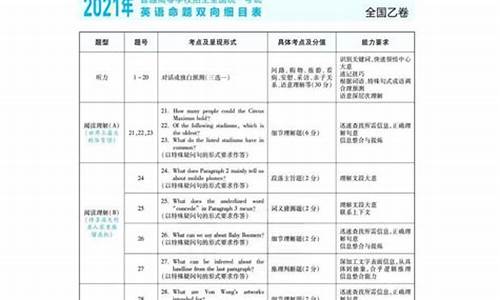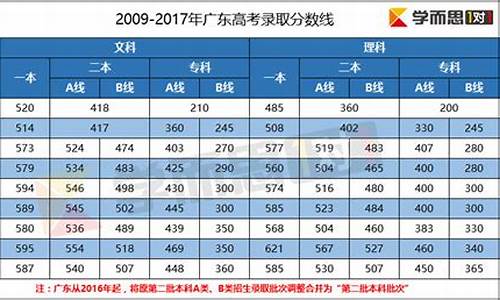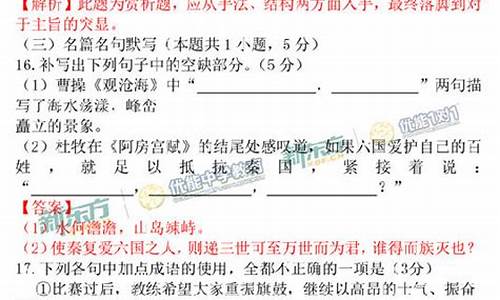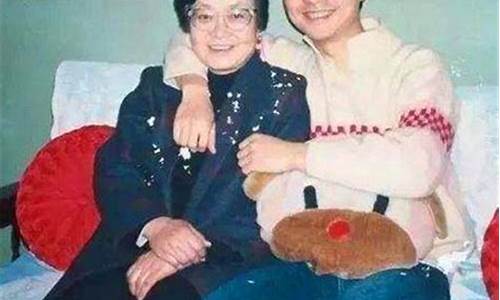您现在的位置是: 首页 > 专业报考 专业报考
英语高考考点明细表图片_英语高考考点
tamoadmin 2024-05-31 人已围观
简介1.高考英语考点2.高考英语改错十个考点3.高考英语13个语法考点4.2021成人高考高起点英语考点练习:书面表达5.高考英语语法考点总结语法无非就考时态,语态,从句,非谓语动词。一,时态方面,要区分什么时候用过去时,什么时候用完成时,还有过去完成时,这三个的用法往往都会混淆,所以经常考这个。辨别什么时候用这三个的哪一个,要看句子里面的时间标志词,画出句子中所有动作的时间轴,就很好做了。二,语态方
1.高考英语考点
2.高考英语改错十个考点
3.高考英语13个语法考点
4.2021成人高考高起点英语考点练习:书面表达
5.高考英语语法考点总结

语法无非就考时态,语态,从句,非谓语动词。
一,时态方面,要区分什么时候用过去时,什么时候用完成时,还有过去完成时,这三个的用法往往都会混淆,所以经常考这个。辨别什么时候用这三个的哪一个,要看句子里面的时间标志词,画出句子中所有动作的时间轴,就很好做了。
二,语态方面,什么时候用被动语态,判断这个需要找动作发出者,而不是光看句子主语,要用自己逻辑判断,别被句子的主语迷惑。虚拟语态虽然有学,但不是重点考核对象,很少出。
三,从句。从句太多种多样了,高中的从句,定语从句是重点。一般考引导定语从句的关系代词或关系副词,还有定语里面的介词,是放在前面还是后面,这个也是常考的。
四,非谓语动词
1 现在分词的用法,做状语,做定语,要区分(注意,做主语那些动词ing叫动名词,不属于非谓语动词范畴)
2 过去分词用法,同上。
3 动词不定式,带to的和不带to的,动词不定式里加入时态和语态变化,也要注意,这是常考的点。
最后,关于做语法题,有几点很好用的提醒,以前我们老师常说。这里分享一下。
情态动词后面接动词“原形”
to不定式后面接动词“原形”
be动词后面接动词ing
很弱智吧,但是就算是高手,也会犯这些低级错误,往往就是顾着想其他方向而忽略这些最基本的东西。这也说明了一个问题,做语法题一定要注意各种细节。
以上。
高考英语考点
高考英语语法填空考点一
若两句(一个主谓关系算一个句子)之间没有连词也没有分号或句号,一般是填连词:Eg. He envied the farmers who hadthe beautiful night stars to give them light ______ his family hadonly expensive lanterns.(答案:while/because/as)(2009 广州普通高中毕业班综合测试一)
若结构较完整,空格后的谓语动词是原形,特别是与上下文时态不一致或主谓不一致时,很可能是填情态动词或表示强调或倒装的助动词(do,does,did等):Eg. The appointment clerksaid that the doctor ______ see her at 3:30.(答案:could)
若缺状语,一般是填副词(在自由填空中考的较少,即使考,也是些常见的简短的.副词,如then 等):Eg. If the primarygoal of language use is communication,_______ mistakes are secondaryconsiderations.(答案:then)
在冠词后,一般是名词或one(s),other(s)等代词。在这一阶段中,通过长期地分析,学生自然可以掌握语法填空的解题技巧。
Eg. But Jane knew from past experience that her ________(choose) of ties hardly ever pleased her father. (答案:choice)(2009 年广东高考)
高考英语语法填空考点二定冠词the与指示代词this,that同源,有?那(这)个?的意思,但意义较弱,可以和一个名词连用,来表示某个或某些特定的人或东西。
1)特指双方都明白的人或物。例如:
Take the medicine. 把药吃了。
2)上文提到过的人或事。例如:
He bought a house. I?ve been to the house. 他买了幢房子。我去过那幢房子。
3)指世上独一无二的事物。例如:
the sun,the sky,the moon,the earth等。
4)与单数名词连用表示一类事物。例如:
the dollar,the fox等。
或与形容词、分词连用,表示一类人。例如:
the rich,the living等。
5)用在序数词和形容词最高级,及形容词only,very,same等前面。例如:
Where do you live? I live on the second floor. 你住在哪?我住在二层。
That?s the very thing I?ve been looking for. 那正是我要找的东西。
6)与复数名词连用,指整个群体。例如:
They are the teachers of this school. (指全体教师)
They are teachers of this school. (指部分教师)
7)表示所有,相当于物主代词,用在表示身体部位的名词前。例如:
She caught me by the arm. 她抓住了我的胳膊。
8)用在某些由普通名词构成的国家名称、机关团体、阶级、等专有名词前。例如:
the People?s Republic of China 中华人民共和国
the United States 美国
9)用在表示乐器的名词之前。例如:
She plays the piano. 她会弹钢琴。
10)用在姓氏的复数名词之前,表示一家人。例如:
the Greens 格林一家人 (或格林夫妇)
11)用在惯用语中。例如:
in the day,in the morning(afternoon,evening),the day after tomorrow,the day before yesterday,the next morning,in the sky(water,field,country),in the dark,in the rain,in the distance,in the middle(of),in the end,on the whole,by the way,go to the theatre
高考英语语法填空考点三1)国名、人名前通常不用定冠词:例如:
England,Mary
2)泛指的复数名词,表示一类人或事物时,可不用定冠词。例如:
They are teachers. 他们是教师。
3)抽象名词表示一般概念时,通常不加冠词。例如:
Failure is the mother of success. 失败是成功之母。
4)物质名词表示一般概念时,通常不加冠词,当表示特定的意思时,需要加定冠词。例如:
Man cannot live without water. 离开水人就无法生存。
5)在季节、月份、节日、 假日、日期、星期等表示时间的名词之前,不加冠词。例如:
We go to school from Monday to Friday. 我们从星期一到星期五都上课。
6)在称呼或表示官衔,职位的名词前不加冠词。例如:
The guards took the American to General Lee. 士兵们把这个美国人送到李将军那里。
7)在三餐、球类运动和娱乐运动的名称前,不加冠词。例如:
have breakfast,play chess。
8)当by与火车等交通工具连用,表示一种方式时,中间无冠词。例如:
by bus,by train。
9)有些个体名词不用冠词。当school,college,prison,market,hospital,bed,table,class,town,church,court等个体名词,直接置于介词后,表示该名词的深层含义。例如:
go to hospital 去医院看病
go to the hospital 去医院 (并不是去看病,而是有其他目的)
10)不用冠词的序数词;
a. 序数词前有物主代词时。
b. 序数词作副词。例如:
He came first in the race. 他跑步得了第一。
c. 在固定词组中。例如:
at(the)first,first of all,from first to last
高考英语改错十个考点
识在于积累、学习在于思考
1
2015
年高考英语语法单选超级归纳
一、冠词
冠词分为不定冠词(
a, an
)
,定冠词(
the
)
,和零冠词。
I.
不定冠词的用法
1
指一类人或事,相当于
a kind of
A plane is a machine that can fly.
2
第一次提及某人某物,非特指
A boy is waiting for you.
有个男孩在等你。
3
表示“每一”相当于
every
one
We study eight hours a day.
4
表示“相同”相当于
the same
We are nearly of an age.
5
用于人名前,表示不认识此人或与某名人有类似性质的人或
事
—
Hello, could I speak to Mr. Smith?
—
Sorry, wrong number. There isn't______ Mr. Smith here.
A.
不填
B. a
C. the
D. one
That boy is rather a Lei Feng.
(活雷锋)
6
用于固定词组中
a couple of, a bit, once upon a time, in a hurry, have a walk, many a time
7
用于
quite, rather, many, half, what, such
之后
This room is rather a big one.
8
用于
so(as, too, how)+
形容词之后
She is as clever a girl as you can wish to meet.
9
用于抽象名词具体化的名词前
success(
抽象名词
)
→
a success(
具体化
)
成功的人或事
a failure
失败的人或事
a shame
带来耻辱的人或事
a pity
可惜或遗憾的事
a must
必需必备的事
a good knowledge of
精通掌握某一方面的知识
II.
定冠词的用法
1
表示某一类人或物
In
many
places
in
China,
___
bicycle
is
still
___
popular
means
of
transportation.
A. a; the
B. /; a
C. the; a
D. the; the
2
用于世上独一无二的事物名词前
the universe, the moon, the Pacific Ocean
3
表示说话双方都了解的或上文提到过的人或事
Would you mind opening the door?
4
用于演奏乐器
play the violin, play the guitar
5
用于形容词和分词前表示一类人
the reach, the living, the wounded
6
表示“一家人”或“夫妇”
(对比上文的不定冠词用法
5
)
—
Could you tell me the way to ____ Johnsons, please?
—
Sorry, we don’t have ____ Johnson here in the village.
A. the; the
B. the; a
C. /; the
D. the; /
7
用于序数词和形容词副词比较级最高级前
He is the taller of the two children.
8
用于国家党派等以及江河湖海,山川群岛的名词前
the United States, the Communist Party of China, the French
9
用于表示发明物的单数名词前
The compass was invented in China.
10
在逢十的复数数词之前,指世纪的某个年代
in the 1990’s
(
二十世纪九十年代
)
11
用于表示度量单位的名词前
I hired the car by the hour.
12
用于方位名词,身体部位名词
He patted me on the shoulder.
III.
不用冠词(又名零冠词)的用法
1
专有名词,物质名词,抽象名词,人名地名等名词前
Beijing University, Jack, China, love, air
2
名词前有
this, my, whose, some, no, each, every
等限制
I want this book, not that one. /
Whose purse is this?
3
季节,月份,星期,节假日,一日三餐前
March, Sunday, National Day, spring
4
表示职位,身份,头衔的名词前
Lincoln was made President of America.
5
表示球类,棋类等运动的名词前
He likes playing football/chess.
6
与
by
连用表示交通方式的名词前
We went right round to the west coast by ______ sea instead of driving
across ______ continent.
A. the; the
B.
不填;
the
C. the;
不填
D.
不填;不填
7
以
and
连接的两个相对的名词并用时
husband and wife, knife and fork, day and night
知识在于积累、学习在于思考
2
8
表示泛指的复数名词前
Horses are useful animals.
二、
名词和主谓一致
I.
名词的种类
专有名词
普通名词
国名地名人名,团体机构名称
可数名词
不可数名词
个体名词
集体名词
抽象名词
物质名词
特别注意名词类别的相互转换
个体名词与抽象名词的相互转换
例
句
意
义
名词性质
①
She held some flowers in her hand.
②
The trees are now in flower
花儿
个体名词
开花
抽象名词
①
Youth is beautiful.
②
He is a youth of twenty
青春
抽象名词
年轻人
个体名词
①
They have achieved remarkable success in their work.
②
—
How about the Christmas evening party?
—
I should say it was a success.
成功
抽象名词
成功的事
个体名词
物质名词与个体名词的相互转换
例
句
意
义
名词性质
①
Iron is a kind of metal.
②
Please lend me your iron.
铁
物质名词
熨斗
个体名词
①
He broke a piece of glass.
②
He broke a glass.
玻璃
物质名词
玻璃杯
个体名词
①
I bought a chicken this morning
②
Please help yourself to some chicken
小鸡
个体名词
鸡肉
物质名词
抽象名词与个体名词的转换
具有动作意义的抽象名词加用
与某些动词(如:
have
等)连
用,表示某一次短暂的动作
①—
I’d like______information about the management of your hotel,please.
—
Well, you could have____word with the manager. He might be helpful
A.some,a
B.an,some
C.some,some
D.an,a
②
They sent us
word of the latest happenings.
消息
(抽象名词)
A.a
B.an
C./
D.the
③
Could we have
word before you go to the meeting?
话(个体名词)
A.a
B.an
C./
D.the
类例:
have a dream/a rest/a smoke/a swim/a trip/a wash/a discussion/a look
take a walk/a bath
make an advance(
进步
)/make an early start(
早点出发
)
/make a decision/make a change/give a cry of pain(
发出痛苦的叫声
) /give a try
表示知识和时间的抽象名词转
换为普通名词时可以用来表示
其中的一部分
①
Many people agree that___knowledge of English is a must in____international trade today.
A.a,
/
B.the, an
C.the, the
D. /, the
a knowledge of truth(
知道实际情况
)
give a fuller knowledge of China(
提供关于中国更为翔实的知识
)
have a knowledge of shorthand(
有速记的知识
)
②
If there were no examination, we should have______at school.
A.the happiest time
B.a more happier time
C.much happiest time
D.a much happier time
③
is money.
A.The time
B.A time
C.Time
D.Times
抽象名词转换为普通名词可用
来表示“一次、一阵、一种”
具体的行为、事件、现象或结
果。这时名词前往往有形容词
修饰
①
Oh, John. _____you gave me!
A.How a pleasant surprise
B.How pleasant surprise
C.What a pleasant surprise
D. What pleasant surprise
②
She looked up
when I shouted.
A.in a surprise
B.in the surprise
C.in surprise
D.in some surprise
其它例子:
The gift came as a complete surprise to me. We have had some unpleasant surprise
③
It is_____work of art that everyone wants to have a look at it.
A.so unusual
B. such unusual
C.such an unusual
D.so an unusual
II.
名词的数
规则名词的复数形式:名词的复数形式,一般在单数形式后面加
-s
或
-es
(参看有关语法书)
。英语里有些名词的复数形式是不规则的,请
看下表
规
则
例
词
1
改变名词中的元音字母或其他形式
man-men, woman-women, foot-feet, goose-geese, mouse-mice
2
单复数相同
sheep, deer, series, means, works, fish, species
3
只有复数形式
ashes, trousers, clothes, thanks, goods, glasses, compasses, contents
知识在于积累、学习在于思考
3
4
一些集体名词总是用作复数
people, police, cattle, staff
5
部分集体名词既可以作单数
(整体)
也可以作复数
(成
员)
audience,
class,
family,
crowd,
couple,
group,
committee,
government,
population, crew, team, public, enemy, party
6
复数形式表示特别含义
customs(
海关
),
forces(
军队
),
times(
时代
),
spirits(
情绪
),
drinks(
饮料
),
sands(
沙滩
),
papers(
文件报纸
),
manners(
礼貌
),
looks(
外表
),
brains(
头脑
智力
), greens(
青菜
), ruins(
废墟
)
7
表示
“某国人”
加
-s
Americans, Australians, Germans, Greeks, Swedes, Europeans
单复数同形
Swiss, Portuguese, Chinese, Japanese
以
-man
或
-woman
结
尾
的
改
为
-men,-women
Englishmen, Frenchwomen
8
合成名词
将主体名词变为复数
sons-in-law, lookers-on, passers-by, story-tellers, boy friends
无主体名词时将最后一部分变为复数
grown-ups, housewives, stopwatches
将两部分变为复数
women singers, men servants
III.
主谓一致
规则
情
况
举
例
语
法
一
致
原
则
以单数名词或代词动词不定式短语,
动名词短语或从句作主
语时,
谓语动词一般用单数形式;
主语为复数时,
谓语动词
用复数形式。
His father is working on the farm.
To study English well is not easy.
Reading in the sun is bad for your eyes.
What he said is very important for us all.
由
what
引导的主语从句,
后面的谓语动词多数情况用单数形式,
但若表语是复数或
what
从句是一个带有复数意义的并列结构
时,主句的谓语动词用复数形式。
what I bought were three English books.
What I say and do is (are) helpful for you.
由连接词
and
或
both
and
连接起来的主语后面,
要用复数
形式的谓语动词。但若所连接的两个词是指同一个人或物
时,它后面的谓语就用单数形式。由
and
连接的并列单数
主
语
前
如
果
分
别
有
no,
each,
every
或
more
than
a
(an)/one,many
a
(an)
修饰时,其谓语动词要用单数形式。
either, neither, each, every
或
no+
单数名词和由
some, any no,
every
构成的复合不定代词,都作单数看待。
.
Lucy and Lily are twins
The writer and artist has come.
Every student and every teach is in the classroom.
Many a boy and many a girl likes it.
No boy and no girl likes it.
Each of us has a new book.
Is everyone here today?
Somebody is speaking in class.
Everything around us is matter
若
none
of
后面的名词是不可数名词,它的谓语动词就要用单
数。若它后面的名词是复数,它的谓语动词用单数或复数都可
以。
None of the sugar was left.
None of us has (have) been to America.
在定语从句里,关系代词
that, who, which
等作主语时,其
谓语动词的数应与句中先行词的数一致。
Those who want to go please write their names on the blackboard.
He is one of my friends who are working hard.
He is the (only) one of my friends who is working hard.
在强调句型中应与被强调部分一致
It is I who am going to the cinema tonight.
It is we who are going to the cinema tonight.
如果集体名词指的是整个集体,它的谓语动词用单数形式;
如果它指的集体的成员,其谓语动词用复数形式
The police are looking for the lost child.
The cattle are eating grass in the field.
His family has moved to the south .(
他的一家
)
His family are watching TV.
(他的家人)
Class four is on the third floor.
(四班)
Class Four are unable to agree upon a monitor.
(四班的学生)
由
a lot of /lots of/ plenty of/ a heap of/ heaps of/ the rest of/the
majority
of+
名词构成的短语以及由分数或百分数
+
名词构
成的短语作主语时,
其谓语动词的数要根据短语中后面名词
的数而定。
There are a lot of people in the classroom.
Three-fourths of the surface of the earth is sea.
50 percent of the students in our class are girls.
此外,还有
a number of +
复数名词有类似的用法(用复数)
,但
the number of +
复数名词的数就得依
number
而定(用单数)
A number of students have gone to the farm to help the farmer pick
apples.
The number of pages in this book is three hundred.
在倒装句中,谓语动词的数应与其后的主语一致
There comes the bus.
On the wall are many pictures.
Such is the result.
Such are the facts.
Between the two hills stands a monument.
下载文档到电脑,查找使用更方便
5下载券 354人已下载
下载还剩21页未读,继续阅读
高考英语13个语法考点
上下文语义矛盾、缺漏和多余、介词误用、代词误用、非谓语动词错用、误用形容词和副词的原级、比较级和最高级是改错考题中必考的项目之一、一致性方面的错误、用词不当、逻辑关系混乱、时态、语态错误。 扩展资料 (一)上下文语义矛盾:通过对近年改错部分的分析,发现出现错误率的频率最高的'就是上下文语义矛盾这一项,上下文语义矛盾,也就是说,根据上文的内容,紧接下来的部分应该是肯定意义,结果原文却用了否定;反之,根据上下文的连贯关系,下文本该用否定却用了肯定。(二)缺漏和多余:缺漏某些不可少或加了某些不必要的词都会使句意不通顺。一般来说,缺漏和多余的词多为介词、代词、冠词或连词。多余还可能出现相同意义的词语叠加在一起或出现两个主语现场。(三)介词误用:介词使句中某些词与其他词发生一定的关系,其在英语中占很重要的地位,故成为又一重要考点等。
2021成人高考高起点英语考点练习:书面表达
她是一个如此的一个笨蛋以致相信了他所说的话。
(4) so + adj./adv. + as to do sth 如此……以致于……
例:He was so strong as to carry the heavy box.
她是一个如此的一个笨蛋以致相信了他所说的话。
(4) so + adj./adv. + as to do sth 如此……以致于……
例:He was so strong as to carry the heavy box.
她是一个如此的一个笨蛋以致相信了他所说的话。
(4) so + adj./adv. + as to do sth 如此……以致于……
例:He was so strong as to carry the heavy box.
高考英语语法考点总结
导语成人高考是很多人进行学历提升的重要途径,当然成人高考考试科目众多,英语就是其中之一,所以需要大家在平时付出一定的努力,好好把握才可以,为了帮助大家更好的进行2021成人高考高起点英语,习题一定要做起来的,今天给大家带来的是2021成人高考高起点英语考点练习:书面表达,赶紧练习起来吧。
1、提示:假设你是丽娜,光明中学的学生,你给你的好友小华写信讲述你的美国之行。内容包括:先去了纽约,看到许多摩天大楼,但看不到世贸大厦了;两天后去了洛杉矶(Los
Angeles),参观了好莱坞,游了迪斯尼乐园;还去了内华达(Nevada)的里诺(Reno),游了风景优美的大沪(Dahu)湖;
注意:(1)不要逐字翻译,叙述要连贯;
(2)写信人的地址可自编;
(3)词数为100左右。
参考答案:
Guangming Middle School No. 273, Xinjiang Road, 400537
Helan District, Binhai, China
July 15, 2002
Dear Xiao Hua,
I have just come back from a trip to the United States. I had a very good
time there.
I first went to New York. It is really a very big city. I saw quite many
skyscrapers there. But the Twin Towers of the World Trade Center are no more to
be seen.
Two days later I went to Los Angeles. I visited Hollywood on the day I got
there. After that I spent a whole day in Disneyland. It is really a wonderful
place you shouldn’t miss.
I also went to Reno, Nevada. There is a beautiful lake named Dahu. The
scenery there is beautiful!
I hope you will take a trip to the United States some day.
Love,
Lina
2、作文要求如下:
(1)一些人喜欢住在城市,因为城市生活有许多便利。
(2)但有些人喜欢住在农村。
(3)我认为,……
参考答案:
Where to live—in the City or in the Country Some people like living in the
city because city life has many advantages. They think there are more job
opportunities in cities, life there is more colorful and meaningful than that in
the country, and there are more modern conveniences in cities for people to
enjoy.
But some other people prefer to live in the countryside. They say life in the
countryside is closer to nature and better for their health, life there is
quieter and that country people are more honest than city people.
I would like to live in a city when I am young to earn enough money and I
live in the countryside when I am old for having a quite life.
以上就是2021成人高考高起点英语考点练习:书面表达,希望参加2021年成人高考考生能够重点关注一下,至于成人高考如何报名,大家可以报名官网进行详细查阅,现阶段还是要认真进行复习备考,加油!
《高考英语语法》百度网盘免费下载
链接: 提取码: 28ue ?
高考英语语法(全民尊享版)









